How to Tactfully Tell Your Boss That You Don't Want to Travel Anymore

A place to share knowledge and better understand the world.

Is it unreasonable to tell your boss that you can’t travel for work anymore? originally appeared on Quora - the place to gain and share knowledge, empowering people to learn from others and better understand the world.
Answer by Tatiana Estévez on Quora :
It isn't unreasonable to not want to travel anymore for your job and it is totally OK to say this to your boss, they might say no, but many managers will be OK with this just to keep you. Unfortunately, you may be risking a long-term cost to your career if this is seen as a bad move. Most roles get redefined over the years and it is natural to minimise things we're not good at or don't want to do and maximise the others, but making people over aware of this can make them feel like there is a loss that needs to be overcome, ideally you would want to make this seem like it is actually good for the company and the better option.
Years ago I had a job that required me to visit several stores where our product was sold and make sure everything was in order. I hated doing this so much, it was a huge amount of time out of the week and I couldn't see any value in what I was doing, however, it was the number one item on my job description. Over time I somehow convinced my boss that it didn't need to be done as often as I was doing it and the part that I was doing could be done by the sales rep when they visited. This wasn't me going into the office and having a big conversation, this was a conversation over several months, discussing the pros and cons. I also phased this out rather than stopping completely, reducing visits to every two weeks and then sometimes going with a sales rep. In the end it was a slow and very natural transition rather than an overnight change. A possible response could have been that this was an essential part of my role and if I couldn't do it then I needed to look for another role, and I was very aware that at the same time I had to maximise my impact within the office so that wasn't something that my company would want to lose. I also showed willingness to do other things outside of my role that did involve travelling. The discussion should include either why this doesn't need to be done or how it can be done differently. It should also come with a possible plan of how to action this with minimum disruption: Possible good reasons for not travelling
- The travelling isn't producing a good return on investment.
- There is someone you're training up and the travelling would be a good development opportunity for them and ease the burden on you.
- There are other elements of your role that require more of your attention and the travel has become a distraction.
It is OK to mention the cost to you, but you saying you just don't want this to be a part of your role, may be seen as you not being able to do your role anymore.
Possible solutions to minimising the disruption/cost
- Conference calls rather face to face meetings.
- Someone else on the team taking on this responsibility (that would like this responsibility).
- Inviting people to the office more often.
Make sure any suggestion makes sense and you can demonstrate how it might work well. Possible plans of action
- Gradually reducing meetings and alternating with conference calls.
- Bringing a colleague the next three times you travel so that you can train them up.
Going from travelling twelve times a year to zero times is a big leap. It might make your boss nervous about any plan you have because it sounds dramatic.
Ten years is a long time for a work relationship, you should also have a sense a little of the best way to approach them and the things they want to hear, they don’t have to keep you, but after ten years you should have built a relationship that you can broach this subject without too much apprehension.
This question originally appeared on Quora - the place to gain and share knowledge, empowering people to learn from others and better understand the world. You can follow Quora on Twitter , Facebook , and Google+ . More questions:
- Travel Tips : What are the best travel hacks?
- Air Travel : Why are people freaking out so much about the laptop travel ban?
- Social Psychology : What is bullying?

Popular in the Community
From our partner, more in contributor.
WORK FROM ROAM
How several older Americans are taking advantage of a remote job to travel and explore
BY MAISY FERNANDEZ

Siobhan Farr, 66 Digital Nomads Beyond 50 founder Home base: Lisbon, Portugal
In 2021, roughly a year after corporate America sent so many employees home with laptops due to the COVID-19 pandemic, the burning question was whether remote work would become permanent. We have our answer. As we approach the four-year anniversary of the pandemic’s start, about 40 percent of American adults still log in from afar, either full-time or in hybrid work arrangements, according to WFH Research. And the share of remote workers is expected to increase, says hiring site Upwork.
We’re entering the next stage of this shift, in which remote workers increasingly explore their new geographical freedom. Many are discovering that “work from home” doesn’t need to be taken so literally and they can travel without using up vacation days.
“What the pandemic made me realize was that older adults were concerned about the quality of their personal lives,” says Siobhan Farr, 66, founder of Digital Nomads Beyond 50, a networking group that has grown to 2,150 members. “What we have left of life is too short to be spent going into the office. People thought they’d have to wait until retirement to travel, but they don’t.”
Though Farr took her experience to the extreme by selling off her belongings and traveling internationally full-time while still working, her Digital Nomads group includes people interested in all levels of this lifestyle. “You don’t have to be a full-time nomad,” says Farr, who has visited 15 countries in nine months. “You can explore for three or four months and be otherwise home-based.”
Here is how some older workers are taking advantage of their ability to roam.
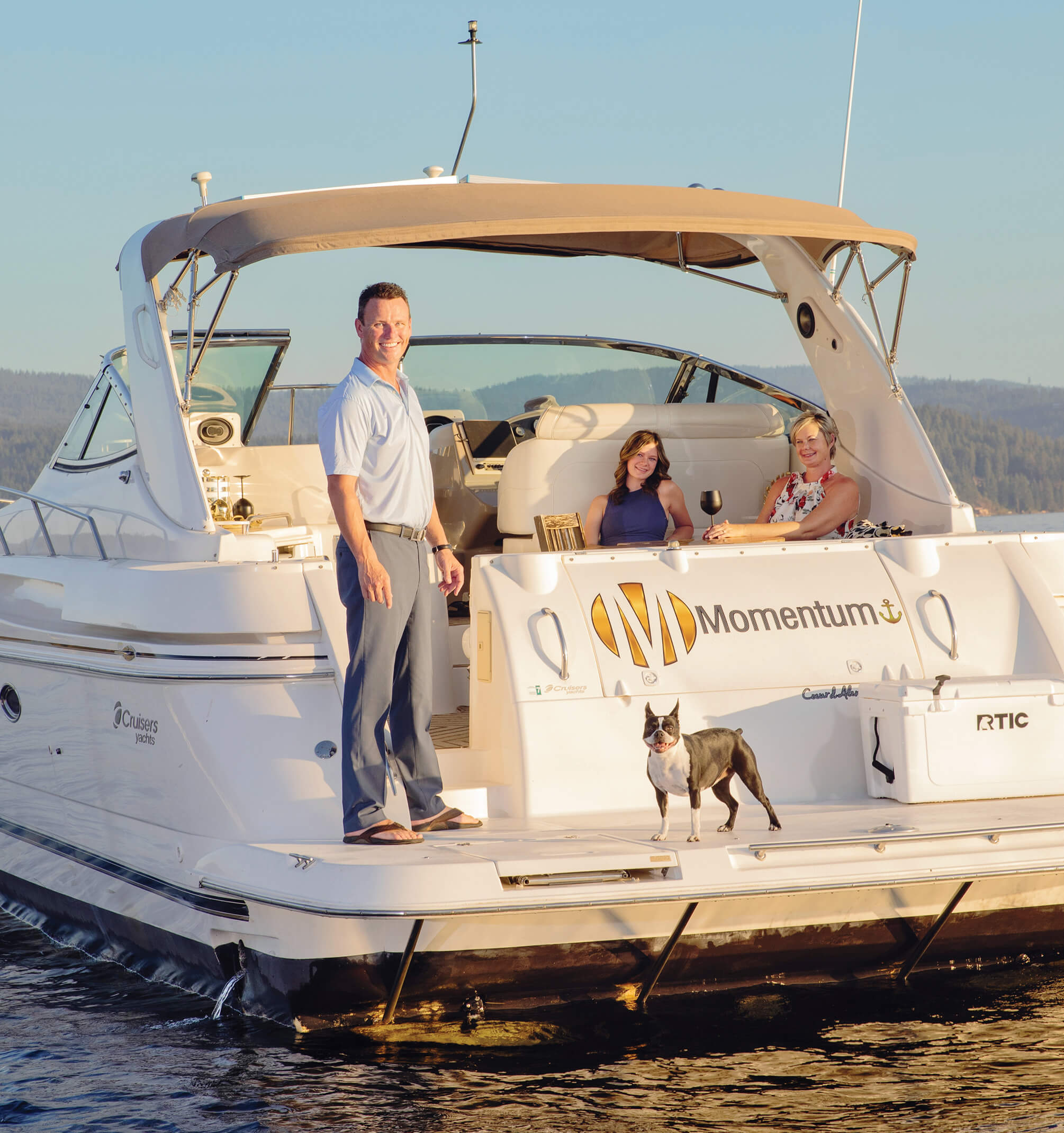
Ben Miller, 50 Financial planner Home base: Couer d’Alene, Idaho
Miller serves his clients’ needs from his cabin in the woods. Or floating on a boat. Or from a rental house. This wasn’t always the case. “I loved going into the office. I had a ‘you must be at work or you will fail’ mentality. I was stuck on that for a long time.” But when face-to-face meetings dwindled and his office rent increased during the pandemic, Miller built an office on his Idaho property. That led to working elsewhere too. “It was an organic transition. You almost have to retrain yourself that you can work from the hotel room and field calls from my stepdaughter’s gymnastics meet in Montana.” During a work-travel trip, Miller generally completes a big chunk of duties in the morning, carves out afternoon free time, then clocks back in at the end of the day. “I don’t want to work for 15 minutes here and 27 minutes there,” he says. “I’d rather get it done, check the box and know that right before the market closes, I’m going to make sure there’s nothing on fire.” Says his wife, Carrie: “The flexibility is the biggest perk. If my family is having a birthday party [in Boise], it’s never ‘Let me see if I can get time off.’ ”
Marsha Stevenson, 54
Graphic designer Home base: North Hills, California
Working remotely means Stevenson can more easily split her time between two important people in her life: her husband and her 86-year-old mother. As a caregiver, she spends the majority of her time with her mom in North Hills rather than with her husband in Culver City, California. Although the distance between those two communities is only about 20 miles, she finds it easier to work much of the time from her mother’s house: “I have to consider Los Angeles traffic.” Stevenson has a supportive supervisor and coworkers, but balancing remote work with caregiving and travel requires transparency. “Giving a heads-up when I won’t be available for an hour or so has helped manage expectations. Be good at communicating what you’re doing, and do what you can to make up for time away. With remote work, employers know they have a dedicated worker who can focus more on their job, knowing their loved ones are still well cared for. I am fortunate to have a really good team to work with. They know that when I can, I will go that extra mile to accommodate a rush job and turn stuff around as fast as I can. It’s life.”
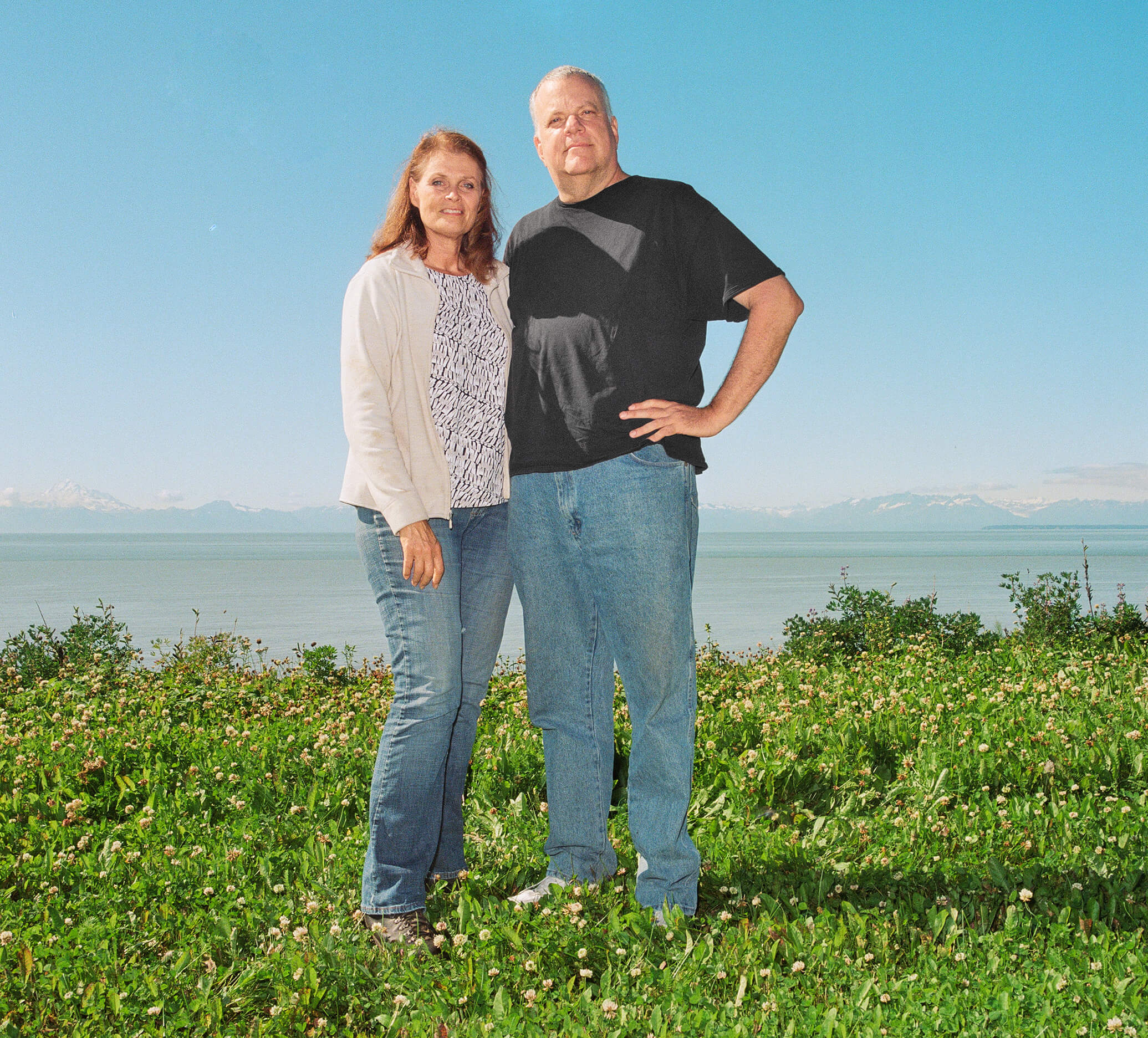
Bob Larson, 59 Technology consultant Home base: Folsom, California
Larson adopted a work-while-traveling lifestyle with his wife, Tami, (both pictured above) after starting a remote job during the pandemic. “Tami’s biggest concern is that she wants to be close to family,” says Larson, whose four adult children live in Utah and the Washington, D.C., area. “We want to visit with them and nurture those relationships.” The couple make frequent treks to their timeshare in the Utah mountains and recently took two family jaunts to Hawai‘i. But they also travel abroad, and their children, friends and other family often visit on those trips. International travel does cause some timezone issues. “I do have to get up at 3 a.m. and have a meeting some days. It’s been an adjustment to break up the workday,” he says. “It’s a sacrifice, but you have to be able to make sacrifices for this kind of lifestyle. The benefits outweigh the drawbacks.” Larson was never a fan of being stuck in an office, so he considers this the ideal scenario. “Gone are the days where you have to sit at your desk for eight hours and wait for someone to walk in the door. It’s very different in today’s environment. You’re just a phone call away.”

Jean Dibble, 61 Translator and English as a Second Language (ESL) teacher Home base: Spokane, Washington
Dibble lived in China, working as an ESL teacher before the pandemic. But she happened to be visiting her mother in Yakima, Washington, when the world shut down. And so her job became remote. As the world reopened, it dawned on her that she could travel while working. “It’s not like I planned this, but COVID gave it to me.” Dibble started by staying in Mexico a few times, then explored Washington state via Airbnb rentals before settling down in Spokane. “Because of time zones with China, I would work weird hours, mostly at night. So I would get up, go out and explore, walk and go look at things and meet friends. I’d make sure I was home by 4 p.m. to get my ducks in a row.” Dibble added another remote job doing English-to-Spanish translation work for a magazine, for which she sets her own schedule. This flexibility has allowed her to visit her mother, go camping in Washington’s Hoh Rain Forest—with a pit stop in civilization to work via Wi-Fi—and see a new baby in her extended family. “Back in the day, I’d count my vacation days and be waiting, waiting, waiting to do something for me. But now I can do that whenever I want. I feel like I can do this work into the sunset. I’m not counting down my days until retirement.”
Maisy Fernandez’s work has appeared in AARP The Magazine, USA Weekend, The Seattle Times and other publications.
BALANCING WORK AND TRAVEL: THE EMERGING RULES OF THE ROAD
→ Regular check-ins are key. Plan times—daily, weekly or monthly—to touch base with bosses and coworkers to ensure that work is on track. “I have to make all of my daily calls, no matter where in the world I am,” Larson says. Be sure to track and share your progress on projects to demonstrate your work ethic and overcome any perceptions that you’re not engaged. With such check-ins, Larson notes, most people often won’t notice that you’re in another location.
→ Stay connected. “Surround yourself with technology, even if you don’t wind up using it,” Miller says. “We get to a place and immediately log on to the internet on all devices, so we’re ready to go.”
→ Make work a priority. “Change locations on the weekends,” Larson says. “Make it easy for your employer to allow you to travel by having few disruptions. Work is the goose that laid the golden egg. Don’t kill the goose.”
→ Create a schedule. Choose the times you will and won’t work. “If you’re going to be at work mentally the entire time on a trip, what’s the point?” Miller says. “You really do have to say, ‘At this hour, I am going to shut off and enjoy being away from my home and enjoy travel.’ ”
→ Trust yourself. “Don’t hold back because you don’t feel like a technology expert,” Dibble says. “At first, I didn’t even know how to set up a Zoom meeting. But you figure it out. If you don’t know all the answers, don’t let that stop you.”
PHOTOS, FROM TOP: IGOR MARTINS (2); ANGIE SMITH; ASH ADAMS; ANGIE SMITH
Unlock Access to AARP Members Edition
Already a Member? Login
- Affiliate Notices
- Privacy Policy
- Work with Us
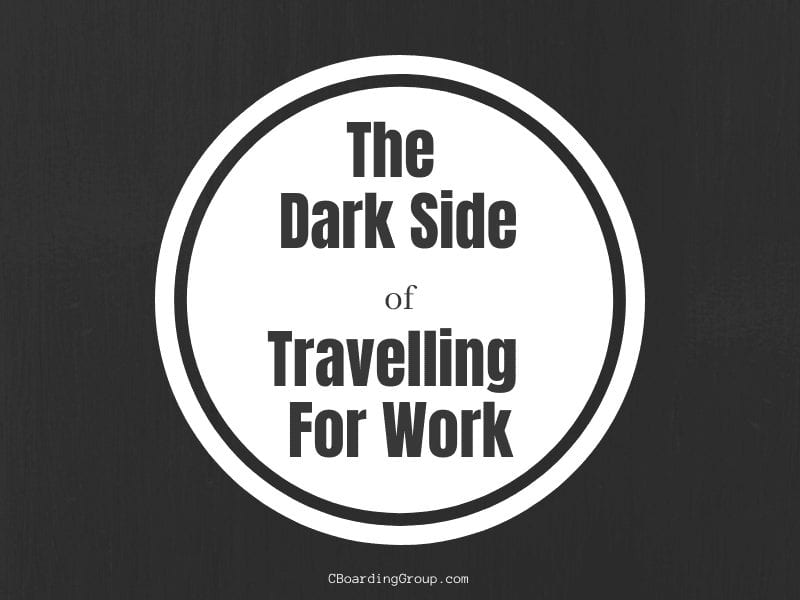
Travelling for Work: The Dark Side of Work Travel [Updated for 2020]
There are many positives to regular work travel ranging from increased career opportunities, more visibility inside your company and of course you get a chance to see different parts of the world on the company’s dime. But the truth is travelling for work has a dark side.
In a 2019 study , NextTravel reported that 1 in 5 business travelers said traveling for work negatively affected their mental health. 25% of respondents noted difficulty in maintaining personal or family relationships and 23% noted having missed an important family event for work travel.
Bottom line : traveling for work has a dark side.
Travelling for Work – quick overview
This article examines the dark side of travelling for work on a regular basis. Specifically, readers will learn five downsides to regular work travel . Here’s a quick summary, before we dig in:
- You are alone a lot
- Sleep schedule / patterns off
- Hard to eat healthy
- Miss family events
- Tough on personal relationships
We deep dive into each of these elements of regular work travel so you know what to be on guard for if you take a job traveling for work. As a frequent business traveler myself I live the grind of recurring work travel every single week and use this insight to share some of the downsides of a life spent on the road.

You are alone a lot when traveling for work
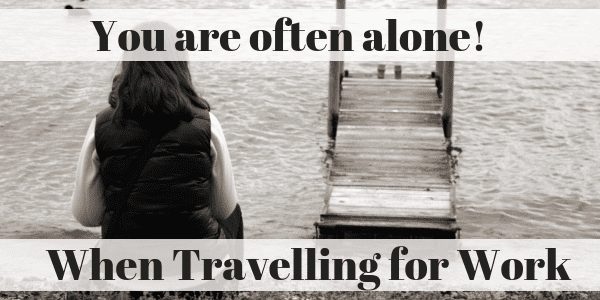
Regular work travel can take you all over the country (or world). You may get to see amazing sights, visit bucket-list destinations and eat at once-in-a-lifetime restaurants – all on the company dime . Except you are likely doing it alone .
When you travel for work there is one consistent element: lots of alone time . For example, on a work trip to Oregon I had some time to kill and took the long way back to the Portland ( PDX ) airport. It was incredible. While wandering around a pretty neat castle in Poland I was, surprise, alone.
In a sweet Mustang convertible (courtesy of National Rental Car ) I drove up the Oregon Coast with the top down. Cute seaside towns, a great lighthouse, a cave full of seals and craggy windswept cliffs. Truly incredible stuff.
But I was alone .
I would have loved to share this experience with my wife (who loves lighthouses) but alas – I was travelling for work again – and thus, oh so alone.
Speaking of Oregon, you might want to check out my post on Things to Do (and eat) in Salem Oregon
Whether it’s night after night by yourself in hotel room, or a tour of the Empire State Building, you are often alone when travelling for work. It’s a huge downside.
In fact, if you’ve ever watched the now famous George Clooney movie, Up in the Air, you know that one thing was very apparent in the actor’s life: he was lonely. Now, in his case, he also had no family and intentionally detached himself from friends and family. But he was alone and his loneliness was a key part of the story.
If you take a job that has travel , try to avoid alienating yourself from friends and family. Invest in these non-travel relationships. If you have a family, make it count when you are home.
Sleep schedule / patterns off when you travel for work

Regular work travel typically means numerous time zones which means it can be incredibly challenging to maintain regular sleep patterns. I live in on the West Coast and often, when travelling for work, I head east.
Waking up that first morning in Eastern or Central Time Zone is BRUTAL. And while many years spent travelling for work have allowed me to hone my body rhythms to not care so much about the time zone I am in, it’s still rough .
The copious amounts of coffee I drink probably help (but are likely not healthy!).

Jetlag , or as the Mayo Clinic defines it , “a temporary sleep problem that can affect anyone who quickly travels across multiple time zones” is a real thing and it can cause fatigue, sleeplessness, mood changes, and put your body in a position where you can be susceptible to sickness (never mind the prolific amounts of germs you come into contact with while travelling for work!).
Bottom line: with work travel, you will be tired . It will be hard to sleep, at times. But you soldier on!
PS…this we wrote about How to get over jet lag while you travel 11 Jet Lag Tips for every traveler , check it out!

It’s hard to eat healthy when you travel for work

I’ve written an entire article on staying healthy while travelling for work because this is such an important subject. It is darned hard to eat healthy (and stay healthy overall) with regular work travel!
When travelling for work, you will eat out for every meal (unless you shop for food which is not always convenient). That means you have an opportunity to eat lots of unhealthy, calorie-laden food!
Don’t get me wrong, it will be GOOD food…good as in tasty in many cases (eating dinner with customers at nice restaurants is a nice perk). But, man, it’s tough to eat healthy. And hard to stay hydrated.
This is a big downside to regular work travel that can sneak right up on you if you are not careful!
By the way, here are some healthy travel snacks ideas
With work travel, you will miss family events

As I write this post I am preparing to head out on another business trip. And unfortunately, with this trip I will miss my children’s choir recital. It’s not the first “kid” event I’ve missed and it always hurts.
I hate being away from my family and I hate missing their events. I’ve missed piano recitals, school plays, soccer practice and more.
It sucks! It really does. But I’ve sat down with my kids and explained to them this is how daddy makes his living. And my wife and I have made a calculated trade off.
This job (which I am really good at) is how I provide for them. I explain I don’t want to miss their events, and I always work REALLY hard not to miss them. I also make sure to be PRESENT when I *am* home.
In fact, that’s Habit #7 of my 7 Habits of the Healthy Business Traveler: How to Stay Healthy While Traveling for Business: Staying Connected ! Whether its regularly texting your loved ones, or using Google Hangouts , or Facetime and making sure you are HOME when you are home – staying connected is critical to maximizing your relationships with your kids.
And I strongly encourage you to have a sit down with your children and explain to them your travel job.
Traveling for Work can be Tough on personal relationships

After years of travelling for work, I can personally attest that it is very difficult on personal relationships. While I’ve been married for over 23 years, we’ve had our rough patches.
One of my job had really heavy work travel and it had me on the road almost every week of the month. It took a brutal toll on my marriage. It came to a head and I had to tell my boss fire me if you want, but take me off the road for a bit.
He was a gracious boss, liked me, and didn’t bat an eye. I took a breather (for a year or so) and worked on my marriage. Then, in a better place (both of us), we agreed it was time to start focusing on my career again – and that meant travel.
Time apart is not on the only challenge on personal relationships for the person with regular work travel. Long periods of time with the opposite sex, including regular work dinners and drinks (all under a work context) can occasionally create situations that can be devastating to a marriage or committed relationship.
The regular work traveler has to be on guard against these things.
How to survive frequent work travel
To summarize, there’s a few key aspects to surviving the downsides of frequent travel:
- Be home when you are home!
- Maintain non-travel friends and family
- Sleep when you can!
- Enjoy the sights as best you can (don’t stay in your hotel room)
- Eat as healthy, but don’t over rotate.
- Take advantage of Bleisure whenever you can
- Bring your family with you if you can
- Travel smarter whenever possible
Employ these tips and you life as a business traveler may not be perfect, but it won’t be all bad.
Final Thoughts on Travelling for Work and Downsides of Regular Work Travel
At this point you might be seriously wondering if there are ANY good things about travelling for work. This is, obviously, quite the list of negatives to travelling for work. And no doubt – that’s true.
But, there are also many positives to a job that travels for work. For example, greater opportunities with your company, higher profile jobs, a chance to meet with clients important to the company, travel with the boss , and more are just some of the pluses to a job with regular work travel.
Additionally, you may get the opportunity to see the world (or parts of it) on the company’s dime . To visit locations you might never get to visit, and to eat at places you might not ordinarily get a chance to eat at. For example, I recently visited Krakow , Poland and it was incredible. Next up (for company work travel) is a trip to England, Copenhagen and Norway. Yep…can’t beat that.
Suffice to say that like any job, you should carefully weigh the pros and cons. A travel job can be incredibly rewarding, but it comes with some downsides. I urge you to consider both the pros and cons of such a job!
If you liked this content, please do us a favor share it on social media and click the “like” button below and don’t forget to follow us on social media including Twitter , Instagram , Pinterest and Facebook .
And, of course, if you are interested in more travel tips and travel advice, you might like these great articles:
- 147 Business Travel Tips the ultimate list of road warrior tips & tricks
- 27 Amazing Hotel Pillows the Best Hotel Pillows You can Buy
- 31 Amazing Hotel Hacks Travel Pros Use all the Time
- 23 Travel Jobs – travel the world and get paid
- 53 Amazing Gifts for Business Travelers in the 2019 Gift Guide for Travelers
- 9 Healthy Travel Snacks eat smarter on the road
- Product Review: OGIO Metro Backpack , The Business Travelers Backpack
- 20 Best Travel Purses
- 101 Travel Hacks for Business Travelers
- 26 Must Have Travel Gadgets & Gear to add to your travel kit
- TSA Food Rules – Can you take food on a plane in hand luggage?
- What is a mileage run?
- Anker PowerCore 200100 Review
- Hilarious Travel Memes
- Why Frequent Travelers should buy their Travel Size Toiletries in Bulk!
- 3 Letter Airport Codes their history, funny ones and more
- Top Travel Pillows
- TSA Drone Policy
- The Best Drone Deals find adrone for a great price
- Hertz Gold Benefits overview of the Hertz Rewards Program
- 10 Practical Tips to Survive the Airplane Middle Seat
- Beats Solo 3 Wireless Review Are these Beats Travel Headphones worth the money?
- How to get through Airport Security Faster with these practical TSA Tips (Travel Tip Tuesday #29)
- Top 5 Grand Rapids Breweries – the beer scene is strong!
- What’s a young driver fee & what’s the best under 25 Car Rental Company?
- Best Packing Cubes you didn’t know you needed
- Trtl Pillow Plus Review – this innovative travel pillow may be what you need
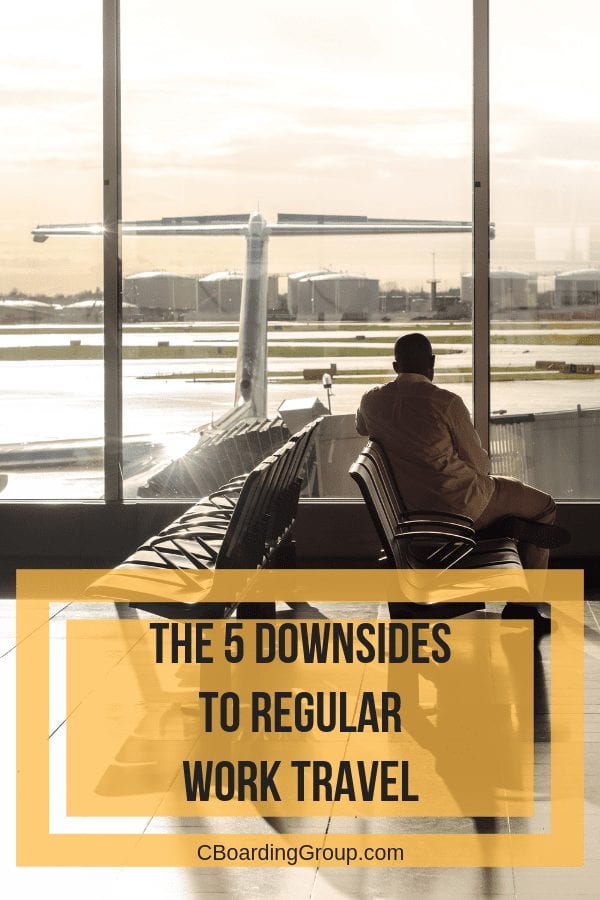
Affiliate Disclosure: As an Amazon Associate I earn from qualifying purchases. I may also earn commissions from other affiliate programs as applicable.
Jeremy Ballou is the editor of the CBoardingGroup.com and a long-time writer in both the travel and tech industry. Most days he's in thinking about travel or writing about it.
7 Cyber Security Travel Tips: Don’t get hacked on your business trip
Checking your bag is stupid…change my mind, you may also like, demon dentist freaks out and removes clothes at..., five days in slovenia: a guide to the..., can i fly with an expired license, what is a redress number and do i..., how to make your bed like a hotel..., how to stop your ears from hurting on..., the traveler’s first aid kit: how savvy business..., 11 tips on traveling with your boss –..., 23 jobs with travel: the ultimate list of..., deal alert: rockland wheeled underseat carry-on 72% off.
But… you can earn points and miles, whilst someone else pays!! 😉 (and then use them for nicer travel time!)
Leave a Comment Cancel Reply
Save my name, email, and website in this browser for the next time I comment.
Interview Question: Are You Willing To Travel for Work?

- Updated January 24, 2024
- Published January 18, 2020
If you’re interviewing for a job that requires you to travel for work, you should prepare commonly asked interview questions about your willingness to travel. The interviewer is interested to hear from you if you are ready to travel as much as the position requires. When you have applied for a job that requires traveling, you need to make sure you have a solid answer ready.
When traveling requirements have not specifically been mentioned before or described in the job description , you should still prepare for this question. This is to make sure that when the interviewers do ask you this question, it won’t catch you off guard.
Related questions to assess your willingness to travel for work are:
- Did you have to travel a lot during your previous positions? Did you enjoy it?
- Do you own a car? Are you willing to use it for business travel purposes?
- How many nights are you willing to spend on the road for work?
Why interviewers ask about your willingness to travel for work
The main reason for interviewers to ask you this question is to assess if you’re willing and able to travel as much as the position requires you to do. Also, they want to know the extent to which you are willing to travel for work. For example, some jobs could even require you to relocate for a certain amount of time.
In most cases, the interviewer will explain the requirements in more detail during the interview. However, it’s possible that they ask you the question ‘ are you willing to travel for work? ‘ first, to see what your answer is.
Usually, the job description already mentions the traveling requirements for the job. If this is the case, the question should catch you off guard during the interview. Furthermore, it should already get you thinking about the fact if you’re willing to do the required travel.
How to prepare for interview questions about your willingness to travel for work
The best way to answer questions about traveling is by giving an honest answer. You want to emphasize specific experiences with traveling that lead you to the conclusion that you’re willing to travel for work. There are several steps that you can take to make sure that you give the interviewer a solid answer to demonstrate your suitability for the job.
Understand the travel requirements for the job
Every preparation for a specific interview question starts with doing your research. In this case, research the company, position, and job description . This way, you make sure that before you apply, you get a good understand of the traveling requirements for the position.
Also, if you already found out that you’re not able to do the required amount of traveling, don’t apply. Either the interviewer will figure out your possible travel limitations, or you will get hired for a job that will not make you happy. Such situations are a waste of time and your career, and should, therefore, be avoided.
Think about your willingness and ability to travel for work
Once you found out the requirements with regard to traveling, you can think about your ability and willingness to travel. It’s important that you’re honest about this. It makes no sense to say that you’re willing to travel when you’re actually not or when you’re not able to for whatever reason.
If you are able and willing to travel, but you have any limitations, state this. For instance, if a personal situation restricts you to travel, make sure you explain this to the interviewer. Try to be as honest as possible in your answers to avoid getting hired for a job you might have to quit in the near future again.
Come up with questions to ask the interviewer for clarification
Asking the interviewer questions back , in general, is a good idea during a job interview. This will make you look interested and engaged. Is this case, when the interviewer asks you if you’re willing to travel for work, you can discuss this and also ask clarifying questions back.
If you are willing and ready to travel, you can still ask follow-up questions to get more information about the required traveling. For example, if the job description only states that traveling is required, you can ask how much traveling is actually involved in the position.
Another question you can ask is how the travel is broken up. In other words, are you away for days, weeks, or months? Other questions that you can ask are:
- Where will I be traveling?
- Are weekend travels included?
- How long do I have to travel on average?
- Are there different purposes for each trip?
Of course, you should tailor your questions to the position that you’re applying to. Doing so will not only make you seem interested and motivated, but it will also keep you from any future surprises about the amount of travel you will have to do later on.
Explain how you have traveled for work in the past
To give your answer more weight, you can explain to the interviewer how you have traveled for work in the past. Furthermore, this shows that you’re comfortable and experienced with traveling for work. If applicable, include details in your answer that align previous travels for work to the position that you’re currently interviewing for.
Focus your answers on how you can add value to the company
Besides the fact that the interviewer is looking for you give a positive answer to the question ‘are you willing to travel for work?’, they also want to hear from you how you can help the company. In other words, don’t only focus on what it can bring to you, but also focus on that you understand why travel is important and needed for the job.
Red flags for the interviewer
There are several elements that interviewers consider warning signs. Below we walk you through a couple of the most commonly made mistakes.
Not providing enough detail
Traveling might be an important part of a specific job that you’re interviewing for. The interviewer wants to know from you what attracted you to this job, why you applied, and how you feel about traveling. It’s important that you can provide the interviewer with a strong answer to all these questions.
For example, if you claim that you do not have trouble with being away for longer periods but you have never experienced this before, this might be considered a warning sign. The interviewer is trying to make the right hiring decision. This means that they are looking for someone who will stay with the company for a longer period.
Failing to respond effectively
Your answers should be short and concise. Avoid rambling and give the interviewer a to-the-point answer to demonstrate your suitability for the job. The same goes for follow-up questions. If you make certain claims about your work experience and you fail to answer follow-up questions the right way, this might come across weak.
Proper preparation will help you avoid such a situation. Thoroughly research the job description and company so that you’re able to explain why you can take on the day to day tasks. In this case, don’t just say that you’re willing to travel but explain why the job suits you and how you successfully traveled for work in the past.
For example, if the interviewer asks you ‘ tell him about a time you had to travel for work ,’ you can expect follow-up questions such as ‘ what was the purposes of your travel? ‘ and ‘ what was the outcome? ‘ Make sure you have answers ready to questions that you expect based on your research.
A positive tone of voice comes a long way. Negativity, on the other hand, is considered a warning sign. If you had negative travel experiences for work, this is not the moment to share them.
Focus your answer on the positive aspects and how you’re motivated to perform the job to the best of your ability.
Sample answers to questions about your willingness to travel
Below we discuss a couple of sample answers to the interview questions ‘ are you willing to travel for work? ‘. However, these are just ‘general’ examples. Make sure that you tailor your answers to your specific situation and the job that you’re interviewing for.
Example Answer 1:
‘Yes, I’m certainly willing to travel for the job. In my current position, I travel approximately one week per month. For me, this is a perfect balance, and I’m comfortable with traveling.
I’m curious to learn more about the position and travel schedule it includes. This way, we can come up with a solution that works well for the company and my personal responsibilities.’
Example Answer 2:
‘I’m definitely willing to travel for work. As a sales representative, I understand very well that meeting regularly with clients is essential to maintain and develop a professional relationship.
The job description states that traveling is required, and I was wondering if you could give me a bit more detailed information about the type of traveling required. This way, I get a better idea of the traveling schedules.’
Example Answer 3:
‘I have worked in sales for most of my career, and I am accustomed to traveling a lot for work. At the moment I spent anywhere between 1 and 3 weeks per month on the road.
The job description mentioned that, on average, approximately 25% to 50% of travel is required for the position. Is this correct? I would like to learn more about the traveling schedules and further requirements. Could you please explain these in more detail?’
Job Interview Topics – Common Job Interview Questions & Answers
Below you can find a list of common job interview topics. Each link will direct you to an article regarding the specific topics that discuss commonly asked interview questions. Furthermore, each article discusses why the interviewer asks these questions and how you answer them!
- Accomplishments
- Adaptability
- Career Change
- Career Goals
- Communication
- Conflict Resolution
- Creative Thinking
- Cultural Fit
- Customer Service
- Growth Potential
- Honesty & Integrity
- Inappropriate
- Job Satisfaction
- Entry-Level & No experience
- Performance-Based
- Prioritization & Time Management
- Problem-solving
- Situational & Scenario-based
- Stress Management
- Telephone Interview
- Uncomfortable
Related posts:
- Travel Coordinator vs. Travel Agent – What’s The Difference?
- Job Interview Question: Teamwork vs Individual Work
- Agency Nurse vs. Travel Nurse – What’s The Difference?
- Interview Question: ‘Why Should We Hire You’ (+Answers)
- Interview Question: How Do You Define Success?
Rate this article
Your page rank:
MegaInterview Company Career Coach
Step into the world of Megainterview.com, where our dedicated team of career experts, job interview trainers, and seasoned career coaches collaborates to empower individuals on their professional journeys. With decades of combined experience across diverse HR fields, our team is committed to fostering positive and impactful career development.
You may also be interested in:
- Interview Questions
Find Your Job-Hunting Personality
Top 15 wells fargo teller interview questions & how to answer, 15 common grant writer interview questions & how to answer, top 15 professional swimmer interview questions, interview categories.
- Cover Letter
- Interview Tips
Megainterview/Contact
- Career Interview Questions
- Write For Megainterview!
- Editorial Policy
- Privacy Policy / GDPR
- Terms & Conditions
- Contact: [email protected]
Sign-up for our newsletter
🤝 We’ll never spam you or sell your data
Popular Topics
- Critical Thinking
- Entry-Level & No Experience
- Honesty & Integrity
- Negotiation Skills
- Performance Based
- Phone Interview
- Problem-Solving
- Questions to Ask the Interviewer
- Salary & Benefits
- Situational & Scenario-Based
- Time Management & Prioritization
- Work Experience
Popular Articles
- What Is The Most Challenging Project You Have Worked On?
- Tell Me About a Time You Had to Deal With a Difficult Customer
- What Have You Done To Improve Yourself In The Past Year?
- Interview Question: How Do You Deal With Tight Deadlines?
- Describe a Time You Demonstrated Leadership
- Tell Me About a Time When You Took Action to Resolve a Problem
- Job Interview Questions About Working in Fast-Paced Environments
- Job Interview: What Areas Need Improvement? (+ Answers)
- Tell Me About a Time You Were On a Team Project That Failed
- Tell Me About a Time You Managed an Important Project
Our mission is to
Help you get hired.
Hofplein 20
3032 AC, Rotterdam, the Netherlands

Turn interviews into offers
Every other Tuesday, get our Chief Coach’s best job-seeking and interviewing tips to land your dream job. 5-minute read.
Can An Employer Force You To Travel For Work?
Home » B2B » Can An Employer Force You To Travel For Work?
Face-to-face interaction and non-verbal communications are as old as human civilization. Interestingly, real-life human interactions continue to be of great value despite the emergence of remote video communication technologies, such as Zoom or Skype. In-person interaction is vital in boosting personal and business relationships. Organizations rely on business travel to expand business, network with prospects, and maintain customer relationships. Travel-oriented jobs profiles like service representatives, marketing executives, medical representatives, and project engineers expect employees to plan and execute frequent business travel across domestic and overseas destinations. However, you may wonder, can an employer force you to travel for work, or can you refuse to travel? Keep reading to discover the answer.
The importance of business travel
The pandemic underlined the importance of in-person interactions, regardless of the extensive use of video meeting apps. Hence, business travel recovered as soon as the pandemic was over.
A remote video call can never substitute the effectiveness of face-to-face meetings in sales and marketing. Travel is of utmost importance for site visits or maintenance of machines. A personal visit improves customers’ perception of the organization. Customers appreciate the efforts one has to take while traveling and meeting personally to address issues.
Human interaction is the core benefit of business travel. A personal interaction eliminates the chances of miscommunication and builds a strong rapport. One can explore a sea of opportunities traveling to a specific business destination. Video calls or zoom meetings restrict your attention to the screen. But a face-to-face meeting allows you to observe several things. These can open new avenues to engage in meaningful discussions.
You will probably make acquaintances with the office staff while waiting for the client meeting. These new acquaintances can be of great help in the future. Traveling to new territories is crucial to explore the market for assessing the potential for new business. Being in the office environment limits your ability to develop new relationships in the market. Most business travelers love to travel and are comfortable meeting new people.
Suggested Read: A Complete Guide To Business Trip Expense Management
Can businesses force you to travel for work?

The question, “can my employer force me to travel abroad or to domestic locations?” can have different answers based on the situation.
An employer has no moral right to force an employee to travel against their will. However, corporate trip is an employee’s responsibility if the job profile includes traveling. Organizations mention the clause of travel in the appointment letter. A sales and service job will require an employee to accept travel as part of their job. Several jobs involve travel across faraway destinations. Refusing to travel despite job requirements may cause loss of job. Employees cannot force you if your job profile does not mention travel as a significant aspect of the job.
The recent pandemic made several employees ask can an employer force them to travel for work if the travel will probably expose them to health risks. The employer can ask employees to travel if their job profile mandates work-related travel. The employee can refuse to travel if the employer does not ensure workplace safety or fails in the duty of care. ‘Can my employer force me to travel abroad’ is a common concern during pandemic outbreaks?’ The employer cannot ask the employee to travel for work if there is a travel restriction in the destination country. There must be a balance between an employer’s Duty of Care and the employee’s right to refuse travel for work. Employees cannot refuse to travel if there are no travel restrictions and the employer is taking proper care to ensure an employee’s safety and well-being.
Can an employee decline a work trip?
Naturally, the company determines how both managers and employees handle business travel. There are a variety of reasons why an employee might not be able or willing to travel occasionally, and it is entirely up to the employer how they handle an opt-out request. Employers and employees should be aware of the following:
- If it is specified in the employee’s contract or other pertinent official documentation, an employer may request that an employee travel for business.
- If an employee has a legitimate concern (such as a medical condition) that traveling could endanger themselves or the company, they have the right to refuse to go (despite their contract).
Most employers are understanding and open to occasionally making an exception.
Tips for maintaining your employee rights
You can take a number of actions to safeguard your rights as an employee if you must travel for work:
- Know your employer’s travel guidelines and any applicable labor laws.
- Keep track of all travel-related costs, such as airfare, lodging, and meals.
- If the travel is unreasonable or poses a serious risk to your health or safety, discuss alternate arrangements.
- Talk to your employer about any issues you have, and ask for clarification on any unclear policies or procedures.
Business travel is essential for employees in sales, marketing, project work, service, and maintenance departments. Several employees travel to diverse destinations for business meetings, trade exhibitions, seminars, or training programs. But, can an employer force you to travel for work? Employers cannot force an employee to travel for work if there is a risk to the employee’s health and well-being. Employers should reassure employees about their safety and comfort during travel by implementing a travel policy that includes expense reimbursement procedures and the duty of care features.
Advanced travel booking and management platforms like Paxes help employers meet Duty of Care obligations. Paxes provides employees instant access to human support through the app if there is an emerging risk or emergency.
Suggested Read: Corporate Flight Booking Benefits For Companies And Travelers
Which job requires frequent traveling?
A sales and marketing job involves frequent traveling across domestic and overseas destinations. Employees from the service and maintenance department must travel to provide on-site service to customers.
How does business travel benefit employees?
Business travel helps employees visit faraway destinations and discover new cultures. It improves their ability to communicate by interacting with several people. Business travel boosts their confidence in managing the uncertainties of travel and enhances their networking skills.
How do companies reimburse travel expenses?
Reimbursement of travel expenses requires employees to create and submit expense statements by attaching receipts. The finance department reimburses the expenses after approval by line managers.
How to say no to frequent work-related travel out of town?
One should discuss with the line managers by justifying a reduction in the frequency of travel. The employee can suggest an alternative arrangement or solution. Refusing to travel up front may impact the career prospects of the employee.
What are the drawbacks of business travel?
Business travel can cause fatigue and stress. It exposes an employee to risks of infections, allergies, and injuries. Long-haul flights cause sleep disturbances. Many employees may experience homesickness if the business trip is for an extended period.
Pratyush is a traveling enthusiast who always looks for innovations in business travel management. He has 5 years of experience writing content on corporate travel management and working closely with expert business travel facilitators.
Related Posts

Travel And Expense Policy: Objectives Of Corporate T&E Policy
Among an organization’s most prominent controllable costs, business travel expense is the second largest after salaries. It impacts the organization’s bottom-line irrespective of the company’s size. While ‘travel and expense’ are unavoidable because of their Read more…

What Is The Meaning Of Open Booking?
Open booking refers to a travel booking approach where employees have the freedom to book their travel arrangements outside of the traditional corporate travel management system. Instead of using a designated platform, employees can book Read more…

Corporate Expense Cards: Types And Benefits
Corporate expense cards for travel ensure easy payment and streamlined management of expenses. These cards can be of any type such as corporate credit cards, prepaid corporate cards, VCC, Airline specific cards, and many more. Read more…
Let's get started!

Thanks for submitting your details.
We'll get back to you shortly.
Interview Questions
Comprehensive Interview Guide: 60+ Professions Explored in Detail
How to Answer “Are You Willing to Travel?” (Interview Question)
By Biron Clark
Published: December 5, 2023
If a job involves any travel, you’re likely to hear interview questions like, “Are you willing to travel?” “How much are you willing to travel?” etc.
So in this article, I’m going to walk you through how to answer all of these interview questions. And we’ll look at how to understand the meaning of “travel percentage,” so you’ll know what the job is really going to require before you say “yes” or “no.”
And finally, I’m going to share multiple word-for-word example answers to help you get confident and comfortable with this type of question. So make sure you read until the end.
Let’s get started…
Answers to “How Much Are You Willing to Travel?”
If they ask an open-ended interview question like this about your willingness to travel, you should state your answer as a percentage.
For example, you could say:
“I’m willing to travel up to 30% of the time. That’s what I did in my last job, and I know I’m comfortable with that amount.”
They may ask you directly for a percentage, with a question like, “what percentage are you willing to travel?” and you’d answer that in the same way. What does travel percentage mean, though? If you’re not sure, it’s essential to understand. So let’s discuss the meaning of “travel percentage.”
Travel percentage meaning: What is travel percentage?
So what does 70 percent travel mean? It means that the employer expects you to be traveling or in cities other than your home city for 70 percent of your working days. So you would expect to spend seven days traveling or away from home for every three days in your home town/office.
This is a very high amount of travel. In my experience working as a recruiter , most travel jobs are 50% or below, because this is less stressful and more sustainable for the worker. So, this is something to keep in mind when deciding how much you’re willing to travel, and whether you’ll take or decline the job offer .
How to Answer, “Are You Willing to Travel X Amount?” – Examples
The hiring manager may also come out and tell you how much travel is involved, and then ask an interview question to determine if this is an acceptable travel amount. In this case, if it’s acceptable to you, then you can indicate that you are on-board with what they’re proposing. For example, you could say:
“That amount of travel will work for me. In my last company, I traveled that same amount, and it worked out fine.”
(It’s always good to show you’ve done something successfully in the past. This is the best way to improve to a new employer that you’ll be successful with them, too!)
No worries if you haven’t traveled for a job before, though…
Here’s an example of how you could still answer this question:
“That amount of travel sounds acceptable to me. I have no problem doing that for this role.”
Here’s another example:
“That sounds acceptable to me. I’d love to hear more about the role, and if it’s a good fit, then I am able to travel.”
Make Sure You Know What You’re Agreeing To
Another thing to keep in mind is the actual travel schedule. Two jobs could both have the same travel percentage – let’s say 50%. But one could have you spending two weeks away and then two weeks at home, while the other could have you traveling for 2-3 days at a time, returning, and doing it all again a few days later.
Depending on your family, children, etc., you may be able to handle one of these travel requirements but not the other. So the travel duration and schedule are two factors you should clarify before answering. You can say, “I would like to understand the company travel schedule a bit better. Can you give me an example of how long each trip would be, or what a typical month looks like?” This will help you get a clear picture of what your work schedule would look like before you answer the interview question. So don’t be afraid to ask questions of your own. You can’t answer interview questions like, “Are you willing to travel for this job?” without knowing what the company expects! For example, if they ask, “Can you travel if the job requires it?” you’d want to respond by saying, “How much travel is expected in the role?” You can’t give a good answer without knowing what they’re proposing or asking, so clarify that first. Once you know what the company expects, then it’s time to directly answer their question and indicate whether you can travel the amount they require.
You Can Also Try to Negotiate Your Travel Percentage/Willingness to Travel
If you’re interested in the job but can’t travel quite as much as they’re proposing, you can say:
“I don’t think I can travel quite that amount. The job and work sound interesting, and I’d love to consider the position if the travel requirements can be reduced to 30%”.
This may work, or it may not (depending on the role and company’s flexibility), but it’s worth asking! This way, you’ll find out the best they can do! You never know if they’re asking, “How much are you willing to travel?” because it’s a hard requirement, or if they’re just wondering how much you’re willing to do So give an honest answer and don’t be afraid to make a counter-proposal.
A lot of job seekers are afraid to set limits or “push back” in a job interview, but this can actually make you more attractive to the company. It shows confidence! However, you also don’t want to rule yourself out in an interview. So if you’re not quite sure, but think it’s possible to travel the amount that the company would like, just say “yes” for now. You’re not accepting the job or signing a contract. You’re just indicating whether this might be possible for you. And your goal in any interview is to get invited to the next step in the process… or get a job offer. So if you think it’s even remotely possible to travel the amount they want, then yes “Yes” and keep interviewing!
You can always go home and talk to friends and family and make a better decision about whether this is right for you! You do NOT need to decide this in the interview!
How to Answer, “Are You Willing to Travel or Relocate?” – Examples
This is a slightly different question. But just like with the questions and sample answers above, you should give an honest, upfront answer. There’s no sense in wasting their time if you absolutely cannot relocate. But if it’s even slightly possible, say “Yes” when an employer asks if you’re willing to relocate. Don’t rule yourself out.
Remember: Your goal in the interview is to impress them and get invited back to the next round – so keep going with the job interview, and ask questions to learn more as you go! You’re NOT wasting the recruiter’s or hiring manager’s time by exploring the opportunity, as long as there’s a tiny chance you’d be willing to travel or relocate for the job. They want the opportunity to sell you on their position! I can’t stress this enough: You’re not wasting their time. I hear a lot of job seekers bring up concerns about this, so I just wanted to set the record straight!
You should now know what travel percentage is, and how to answer any time an employer asks about what percentage you’re willing to travel.
Remember – you’re not signing a contract or agreeing to anything in writing; you’re merely indicating whether this could potentially work (for the right opportunity). So stay calm, use the sample answers above, and be direct/concise when responding in a job interview.
This isn’t one of those interview questions where the hiring manager needs to hear a long-winded answer. So once you’ve answered the question, stop and let the interviewer move on!

About the Author
Read more articles by Biron Clark
Continue Reading
12 Expert-Approved Responses to ‘What Makes You Unique?’ in Job Interviews
15 most common pharmacist interview questions and answers, 15 most common paralegal interview questions and answers, top 30+ funny interview questions and answers, 60 hardest interview questions and answers, 100+ best ice breaker questions to ask candidates, top 20 situational interview questions (& sample answers), 15 most common physical therapist interview questions and answers.
The depressing reality of quiet vacationing
Why is everyone suddenly going on trips without actually taking time off?
Who among us has not done a little fibbing at work? A little résumé embellishment here, a fake dental appointment there. Now people are taking full-blown holidays while on the job as part of a trend that's been called " quiet vacationing ."
There's no set definition of quiet vacationing, and it can encompass a variety of behaviors — traveling to a faraway place and not saying anything while still getting your work in, or not working but keeping your mouse moving to appear as if you're online in hopes that no one will notice your drop in productivity.
On the one hand, this sounds like an awesome, novel possibility brought about by the rise of remote work. Responding to the 10th email of the day while sipping a margarita on the beach sounds a lot nicer than doing it from an office desk as a coworker nearby munches loudly on their sad salad . If work gets slow in the summer, there's no good reason to sit and stare at your computer.
On the other hand, the idea that people are under so much pressure at work that they feel they can't take true disconnect-from-everything time off or even tell their boss they're working out of town for a bit is deeply depressing. It's a stark reminder of how broken American work culture is, just in time for summer.
Related stories
"It may be a question of just psychological safety, or lack thereof, that the employee doesn't feel like they can openly have a conversation with their manager about taking real time off," said Rebecca Zucker, an executive coach and the founding partner of Next Step Partners, a leadership consultancy. "We're all big boys and girls, and it's a question of not where we're working or when we're working, in terms of the hours we're working, but are we doing what we need to get done."
The whole quiet-vacationing discourse got kicked up by a recent Harris Poll survey on out-of-office culture. It found that 28% of workers said they'd taken time off work without telling their bosses — basically, they're out of the office, but not "officially." Millennials in particular have picked up on the practice, with 37% saying they'd dipped out of work on the sly.
People feeling like they have to be sneaky about their whereabouts is not a positive sign.
It's not that these workers are unhappy with the vacation their companies offer: 83% of respondents said they were satisfied with their company's paid-time-off policy. The issue seems to be that employees don't feel like they can actually use the time off they're given. Eight in 10 workers said they didn't use the maximum amount of PTO allowed; some said they felt pressure to always be available, while others cited a heavy workload as their reason. Almost half said they got nervous about requesting time away, and three-quarters said they wished their workplace culture put more value on taking breaks. Workers reported being tricky about the whole thing, too: About a third said they moved their mouse to make it look like they were online, and about the same share said they scheduled messages outside work hours to give the impression that they were working overtime.
The problem isn't really that people are working from elsewhere, especially if it's not hurting their productivity . The greater issue is what it signifies about their relationship with work and the incentives that have been fostered at their companies . People feeling like they have to be sneaky about their whereabouts is not a positive sign, nor is feeling like the only way to disconnect is to remain half plugged in.
The people taking vacations on the sly may be at organizations that are likelier to reward overworkers, said Malissa Clark, an associate professor and the head of the Healthy Work Lab at the University of Georgia. In turn, those quiet vacations may perversely reinforce the always-on culture, even when always being on isn't necessary or leading to better business results. Clark, who also wrote the book "Never Not Working: Why the Always-On Culture Is Bad for Business — and How to Fix It," pointed to 2015 research looking at how some men at a consulting firm were able to pull back from work while pretending to still put in 80-hour weeks. Their managers couldn't tell the difference, and they were rewarded for giving off the impression that they were workaholics, whereas men who were up front about needing to downshift were penalized.
"That's why there's this pressure for people to constantly be working and feel like if they take a step back they'll be left behind, because that's a very real thing," Clark said. "Apparently, that's what a lot of organizations reward."
Pretending to work when you're not or acting like you're putting in more hours than you do is not a new phenomenon . Zucker recalled working years ago at an investment bank where men would leave their suit jackets on the backs of their chairs after hours so people would think they were still somewhere in the office. But technology does make this behavior easier. The ability to connect from anywhere is a double-edged sword: Sure, it's nice to be able to answer an email on a midday walk or work from a relative's house over the holidays, but it sucks to know your boss knows that you saw that 10 p.m. Slack message pop up on your phone.
This is a societal problem and one that is uniquely American. We're told to go, go, go, made to feel like we can never get off the treadmill for even a second, lest we fall behind or give the impression that we're not trying hard. We often don't see taking time off as necessary and well deserved but as a sign of laziness and lack of work ethic. People aren't told to work to live; they're told to live to work.
Some of the fundamentals underlying quiet vacationing are positive. We live in an era where a lot of people can work from wherever and have more flexibility to achieve a better work-life balance. The rub is the sneakiness of it all. It would be much better if we were talking about, say, "loud working from anywhere for a month," or whatever you'd want to call it. (Or we could stop coining terms for work trends, the true dream.) It should be OK to have a conversation with your manager about spending a few days in the mountains or on the beach and, as long as the WiFi is decent, fulfilling your capitalist soldier duties.
Clark said this trend may make employers even more eager to force workers back to the office. Managers don't always love the idea that they don't know where their employees are, and they have the (often false) impression that being out of sight means not working.
Working from elsewhere does not erase the need for an actual vacation. There's all sorts of research indicating that time off improves mental and physical health, reduces stress, and boosts productivity, among other benefits. Even planning a vacation makes people happier. People need to psychologically detach from work in order to relax and recover.
By always feeling like you have to stay connected, you never recover from work.
"By always feeling like you have to stay connected, you never recover from work," Clark said. "And so it's like you're constantly running a marathon, but then you never take a break, and what is it going to do? It's going to wear your body down slowly, gradually, to the point where you hit a wall. And then all of a sudden you're burnt out."
If you're quiet vacationing and your boss doesn't know, good for you, I guess. But it would probably be better if you could be honest about where you are and what you're doing. And none of this scraps the need for an actual vacation. Regardless of how up front (or not) employees are, at the end of the day, American work culture is the bad guy here. The toxicity of hustle culture is the real problem, not the person who's low-key working from a cabin in the woods or the coworker who said screw it and is taking three weeks off.
Emily Stewart is a senior correspondent at Business Insider, writing about business and the economy.
About Discourse Stories
Through our Discourse journalism, Business Insider seeks to explore and illuminate the day’s most fascinating issues and ideas. Our writers provide thought-provoking perspectives, informed by analysis, reporting, and expertise. Read more Discourse stories here .

More from Careers
Most popular
- Main content

Don't Want Your Employees to Take a Quiet Vacation? Then Just Let Them Take a Real Vacation
S cience to bosses: Stop arguing about the ethics of hush trips and quiet vacationing and just give employees adequate time off instead.
According to a recent ResumeBuilder survey, almost half of Gen-Z workers have taken what the pollsters term a hush trip -- a.k.a. traveling while pretending to be working from home, similar to quiet vacationing -- with a majority saying their boss was never the wiser.
This stat, and a flood of social media content about the phenomenon, has caused a fair amount of hand-wringing and debate in business circles. Are young employees deceitful and entitled? Or are bosses obsessed with performative busy work ? What should we make of all this secret vacationing?
But maybe the answer is simpler than all that. Maybe companies just need to let their employees take real, extended vacation time instead.
Quiet vacationing: good or bad?
I myself recently wrote a column arguing that bosses should chill about hush trips (after all, how productivity-sapping could all this quiet vacationing be if you've never even noticed it?).
Meanwhile, my Inc.com colleague Suzanne Lucas responded with a thoughtful rebuttal from the HR perspective. She outlined all the ways an employee's undisclosed hush trip could get a company in legal hot water. Fair point. If your employees are crossing state or international lines for a prolonged period, you really need to know.
There is also clearly a range of deception and productivity impacts involved with hush trips. An employee working from the deck of the lake house they rented for a long weekend? Sure. Someone "working" while standing in line for Space Mountain? That's not a hush trip--that's full-on faking a work day.
But with summer vacation season about to get into full swing, there is perhaps another even more obvious point to make about quiet vacationing. No one would be tempted to do it at all if American bosses just borrowed from the European business playbook and allowed their teams to take real, extended vacations . A whole pile of research suggests that in the end, that would be better for everyone than employees continuing to sneak around.
It's no secret why hush trips are all the rage.
It's well documented that even though many U.S. employers offer less PTO than their European counterparts ( the E.U. minimum is 20 days a year , plus at least 12 public holidays), many American workers still do not feel comfortable taking the measly amount of time off they are offered.
A recent Harris poll showed that while 83 percent of respondents were satisfied with their company's paid-time-off policy, eight in 10 said they didn't use the maximum amount of PTO allowed. This is just the latest in a long line of studies showing that American employees leave a huge amount of vacation time on the table because they fear their bosses, are overburdened at work, or think demonstrating endless hustle is the only way to get ahead.
As Richard Branson once said , the amount of holiday time that people get when they work for American companies "is something of a disgrace." That is clearly both a bummer for American workers and the main driver for the hush trip craze.
Science to bosses: Just let your employees take a proper vacation
But stingy vacation policies aren't just unpleasant for workers. A ton of research shows they're actually bad for bosses, companies, and productivity. You might think you are getting more out of your employees by forcing them to sit at their desk for more hours -- and you might be right in the short term -- but in the long term, overwork very clearly leads to reduced performance.
One Ernst & Young study showed that for every additional ten hours of vacation time an employee took, their year-end performance improved 8 percent. Another study showed that if someone takes all of their vacation time, it actually increases their chance of getting a raise or promotion , suggesting that getting away from the office does good things for performance. Still not convinced? Here's a survey showing big spikes in employee motivation after time off .
Being miserly with PTO is a false economy when it comes to productivity -- but that's not the only reason stinginess backfires for bosses.
"Uncluttering your mind allows you to think more clearly and boosts creativity. This can happen in both small and big ways while on vacation," points out executive coach Rebecca Zucker on HBR . She cites Lin-Manuel Miranda getting the idea for Hamilton on vacation as a prime example of the creativity-boosting powers of time away.
And here's one final data point that I hope will sway even the staunchest vacation skeptics. The NIH reports that for every 10 additional days of paid vacation leave, the odds of depression are 29 percent lower. Depressed workers are not known to be the best workers (setting aside the human cost and moral dubiousness of driving your workers to depression).
All of which suggests the right response to the quiet vacationing trend isn't to argue about the work ethic of employees or the legal consequences of their deception. It's to give your people enough PTO (and real permission) to take a proper, extended vacation this summer. Then they won't need to lie to you.
Both research and the experience of the entire continent of Europe suggests your business will be just fine -- or even better off -- because of your generous leave policies.
This post originally appeared at inc.com .
Click here to subscribe to the Inc. newsletter: inc.com/newsletters "

Drone light shows turn night skies into a canvas. Why you don't want to miss them

There's a buzz in the air − literally − and it's turning the night sky into a blank canvas for a growing medium: art and animation produced by drones.
After roughly a decade of advances in what drones can do, swarm drone light shows are hitting their stride and gaining a foothold in more public spectacles that were once almost exclusively fireworks-centered: Super Bowl halftime shows, baseball games, conferences and, of course, Fourth of July celebrations.
What began as a novelty − the ability to send up multiple drones and synchronize them to make patterns − has evolved into more elaborate and larger-scale light shows. The demand for these shows has opened up new opportunities for companies that specialize in the lengthy planning and setup involved in sending up hundreds of drones at once.
Bernard Ozarowski, president of Alexandria, Virginia-based Pixis Drones, applied a video game analogy to the rapid advances in drone light show sophistication.
"To make an analogy to a different medium, we're just getting past the Atari days; maybe we're through the Intellivision, but it's not going to take us 50 years to get to a Playstation 5. The technology is evolving very, very quickly and improving every couple of months."
Pixis Drones has staged numerous shows that span game launches, television premieres and sporting events, including Super Bowl LVI in Los Angeles in 2022.
"It's about the emotional connection to the people on the ground," Ozarowski said. "We can do what fireworks can't. We can tell a story and make people feel something."
Drone delivery: Chick-fil-A via drone delivery? How the fight for sky dominance is heating up
How drone light shows work
In much the same way a marching band performs a football halftime show in which each musician must hit a precise mark on the field at a certain time in the music, each drone is preprogrammed to hit a finite coordinate in the air at a preset time.
These coordinates are stored as flight paths in simulation software on the pilot-in-charge's computer. This same software can simulate wind conditions other variables to ensure a smooth show. When setting up for a show, crews arrange the drones − or stacks of drones, depending on the size of the show − in an orderly grid. Each drone is numbered and corresponds to a node in the computer.
The specific kind of drone Pixis and Sky Elements use is a Uvify IFO swarm drone. It's small − 10.8 inches wide − and has a horizontal speed of nearly 33 feet per second. Each drone carries an array of three 24-bit RGB LED lights that can produce millions of colors.
Are drone light shows safe?
Drone show operators routinely file for waivers from the Federal Aviation Administration that allow them to fly drones at night and exceed the 400-foot ceiling usually enforced for drones in U.S. airspace.
Though not entirely without risk − these are 2-pound aircraft with propellers, after all − trained pilots running the shows have safety plans in place that include the flight area, a virtual boundary called a geofence and a safety team that includes visual observers and perimeter watchers. If a drone were to cross the geofence, generally set 150 to 200 feet around the flight area where there are no people, onboard commands either force the drone to return to the landing area or drop from the sky to reduce risk to people.
To illustrate how this looks, here is an example of the flight safety area for a show Pixis is staging in Gallup, New Mexico, for the city's Fourth of July "Stars & Stripes Celebration" at the Gallup Sports Complex, with safety zones represented as 400-foot-high boxes:
How big can drone shows be?
Drone light shows are limited only by the number of drones and the battery life. Though safe battery performance falls in the 10- to 15-minute mark, drone operators can send out multiple waves of drones to stagger the optimal flight times.
Tyler Kubicz, a production manager with Sky Elements, a national drone show company based in the Dallas-Fort Worth area, says the shows have room to grow as the technology evolves.
"The artistry of drone shows is only expanding with all these improvements," Kubicz said. "Our team continues to push the production and artistic boundaries for drone shows."
Sky Elements has performed many high-profile drone light shows for Major League Baseball games, Fourth of July celebrations and, most recently, was featured on NBC's "America's Got Talent."
Kubicz says Sky Elements' company record for drones used in a single show is 1,592, set in November 2023 at an expo in Orlando, Florida.
As of May 1, the world record for the number of swarm drones flown simultaneously is 5,293 , set by Uvify in South Korea.
Are drone light shows more pet-friendly than fireworks?
Though many drone light show runners coordinate with fireworks and pyrotechnics, they point out the advantages of drone-only light shows: a more approachable experience for military veterans stricken with PTSD, neurodivergent people and house pets that get easily stressed by fireworks explosions.
Drone shows "open up these types of communal experiences to people who otherwise would be excluded, and I think that's particularly relevant as we head into the Fourth of July holiday season," Ozarowski said. "We open up new possibilities for people who would otherwise not be able to enjoy these celebrations."
SOURCES Pixis Drones, Sky Elements, Uvify , Tech It Out with Marc Saltzman

IMAGES
VIDEO
COMMENTS
Fortunately I don't have to travel for work at this point - but I'm with you 100% on wanting to drive alone. I don't even like carpooling to local conferences, or lunch. Long distance would kill me. I really hate having to drive people places in my car, but not as much as I hate being the passenger in a co-workers car.
by Alison Green on August 4, 2017. It's five answers to five questions. Here we go…. 1. Can I refuse to travel for work? I started a position two and a half months ago, working as an academic advisor in higher education. The job description for this position did not mention anything about traveling.
Natalie is a Paul and Daisy Soros Fellow and served as a 2010 Fulbright Scholar in Thailand. Our travel columnist loved going to new places—until she didn't anymore. Whether you're exhausted, tied up with work or family, or just don't feel like getting on the road, read her advice for moving past anti-wanderlust.
7. In general you can't refuse work trips. Whether it's to get training on something, to visit a client, to attend the company's conference, or to come to head office to meet your colleagues, once management decides you should do it, you need to do it. Ideally they would make the travel experience pleasant - a flight on a reasonable airline, a ...
Inviting people to the office more often. Make sure any suggestion makes sense and you can demonstrate how it might work well. Possible plans of action. Gradually reducing meetings and alternating with conference calls. Bringing a colleague the next three times you travel so that you can train them up.
On a related side note, we haven't even looked through our beautiful, expensive wedding photos yet. We are the actual worst people. 4. The day you quit your job will be the most exciting & scary day of your life. Followed shortly by the day you actually leave for the airport to start your travels.
4. Photo by JESHOOTS.COM on Unsplash. M illennials can chalk up another death to our names: the work trip. Many folks my age are starting to put their foot down on traveling for work. Here's why ...
However, there is no definitive answer to be found in The Department of Labor's. Occupational Safety and Health Act. (OSHA) regarding whether an employee can refuse to travel for work, or whether they can be fired for not traveling for work. Since there is no one answer, employers should assess each business trip on a case-by-case basis.
I don't know how I will tolerate 20+ hours of travel. You talk about layovers, so I'm assuming you aren't doing more than ten or so hours on a single plane. If you haven't done this before you shouldn't assume it will be an impossible problem for you. At layovers you will get to stretch, and frankly you can even do it on a plane to some extent.
Make sure any suggestion makes sense and you can demonstrate how it might work well. Gradually reducing meetings and alternating with conference calls. Bringing a colleague the next three times ...
Before you think about declining a work trip, you'll need to ask yourself whether the request at hand is in line with the amount of travel you're expected to do in the course of your job. Some ...
During a work-travel trip, Miller generally completes a big chunk of duties in the morning, carves out afternoon free time, then clocks back in at the end of the day. "I don't want to work for 15 minutes here and 27 minutes there," he says.
There are many positives to regular work travel ranging from increased career opportunities, more visibility inside your company and of course you get a chance to see different parts of the world on the company's dime. But the truth is travelling for work has a dark side. In a 2019 study, NextTravel reported that 1 in 5 business travelers said traveling for work negatively affected their ...
3. Keep your essentials packed and ready to go in your suitcase. Keep your essential items, such as toiletries and medicines, always at hand and ready to pack. If you travel often, it's a great idea to keep these items in a case which you only use for your trips. 4. Keep your essentials handy when on the road.
One of the best parts of business travel is taking clients out on the town for dinner (and maybe a few drinks). This can be a key moment in cementing a working relationship or landing a new deal. It can also be a potential minefield if you haven't done your homework. "The first step is knowing your options," Dov said.
Example Answer 3: 'I have worked in sales for most of my career, and I am accustomed to traveling a lot for work. At the moment I spent anywhere between 1 and 3 weeks per month on the road. The job description mentioned that, on average, approximately 25% to 50% of travel is required for the position.
Lots of people decide against travel and there's nothing wrong with it. There's lots you could spend that time and money on that would be just as good for you. You do you. Traveling is a luxery. Not everyone in the world can travel. If you want to stay home, stay home. Don't put that social pressure on yourself.
Employees cannot force you if your job profile does not mention travel as a significant aspect of the job. The recent pandemic made several employees ask can an employer force them to travel for work if the travel will probably expose them to health risks. The employer can ask employees to travel if their job profile mandates work-related travel.
If they ask an open-ended interview question like this about your willingness to travel, you should state your answer as a percentage. For example, you could say: "I'm willing to travel up to 30% of the time. That's what I did in my last job, and I know I'm comfortable with that amount.". They may ask you directly for a percentage ...
A Hipmunk Survey on millennial travel found that 74% of millennials have stayed at a vacation rental (such as those available through Airbnb) on a business trip , an experience shared by just 38% ...
A place for all of those interested in solo travel to share their experiences and stories! Experiences Quitting Job to travel. Hello folks! I have perused the subreddit on advice or experiences when dealing with employers before solo traveling. As some background information I am a 28M that has always craved going backpacking in Europe for an ...
The whole quiet-vacationing discourse got kicked up by a recent Harris Poll survey on out-of-office culture. It found that 28% of workers said they'd taken time off work without telling their ...
The quick answer is "maybe.". The longer answer is that even if an employer can force an employee to travel, it would be an extremely poor management decision to do so. The General Duty Clause ...
Follow these CDC guidelines for business travel during COVID-19: 1. Avoid unnecessary travel during periods of high community spread. Depending on community spread and your personal risk factors, you may want to limit any unnecessary travel. Even if you still have to travel for work, try to reduce how often you fly domestically, such as ...
According to a recent ResumeBuilder survey, almost half of Gen-Z workers have taken what the pollsters term a hush trip-- a.k.a. traveling while pretending to be working from home, similar to ...
Check out Elliott Confidential, the newsletter the travel industry doesn't want you to read. Each issue is filled with breaking news, deep insights, and exclusive strategies for becoming a better ...
However, there is no definitive answer to be found in The Department of Labor's. Occupational Safety and Health Act. (OSHA) regarding whether an employee can refuse to travel for work, or whether they can be fired for not traveling for work. Since there is no one answer, employers should assess each business trip on a case-by-case basis.
To illustrate how this looks, here is an example of the flight safety area for a show Pixis is staging in Gallup, New Mexico, for the city's Fourth of July "Stars & Stripes Celebration" at the ...
An international roaming outage is leaving customers of the three major US mobile carriers in the dark, making it difficult or impossible for American customers who are currently out of the ...
Former New York Mayor Rudy Giuliani was ordered to travel to Arizona and post a $10,000 bond after pleading not guilty to charges of conspiring to overturn the 2020 presidential election. He ...